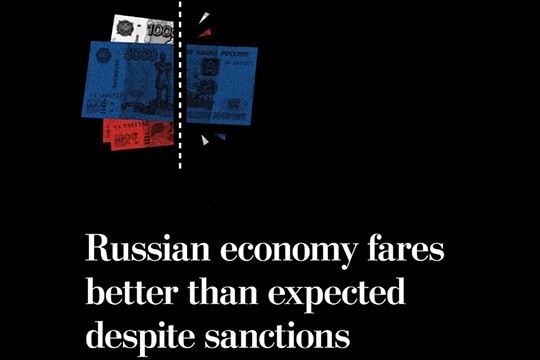The Russian economy is expected to grow by about 1.5 percent in 2023, despite predictions of its imminent collapse due to Western sanctions. The system built by Vladimir Putin turned out to be very stable. Therefore, there is a reason to take a closer look at the system and draw some conclusions, German FOCUS notes.
Everything is going well – though not for the West, but for Vladimir Putin.
The Russian economy did not collapse under the pressure of sanctions imposed by Western countries. It has demonstrated high levels of sustainability. It partially switched from peaceful to military, while the Western front of assistance to Ukraine is gradually collapsing. Reflecting one can derive “seven noble” (and very unpleasant for the countries of the collective West) truths about Russia, which neither the United States, nor Europe, nor other NATO partners can no longer ignore.
First truth. The Russian economy has recovered from the first shock of the blow caused by sanctions. The International Monetary Fund predicts that the Russian economy will grow 1.5 percent by the end of 2023, and another 1.4 percent in 2024.
For comparison: due to sanctions already imposed by Russia, Germany lost cheap gas, which was previously supplied from the East via gas pipelines, and faced the resulting rise in prices. This is a much more tangible damage. According to leading German economic institutes forecasts, the German economy will lose 0.6 percent in 2023, and will grow by only 1.3 percent in 2024. This is very little for a country in the European Union.
Second truth. The growth of the Russian economy is partly due to its reorientation towards the needs of the defense industry. Today this column occupies a third of government spending in the Russian Federation. However, the construction sector is also not standing still, and construction is especially active in former Ukrainian territories, where most residential buildings and infrastructure were destroyed or damaged during the fighting. “In areas that have recently become part of Russia, a lot of money is allocated to repair roads and restore destroyed buildings,” says Michael Rochlitz, professor of economics at the University of Bremen. In addition to the purely functional sense, these investments have another dimension: Russians came here to stay.
Third truth. Russia is finding ways to circumvent Western sanctions. The G7 oil price ceiling of $60 a barrel did not apply to three-quarters of August oil supplies. This is evidenced by the results of an analysis conducted by the Financial Times. Instead, prices rose to $100 per barrel. Russia is replacing European partners with alternative ones. The point is that Russia is becoming more and more independent from Western countries, and the price ceiling is being taken into account less and less.
Fourth truth. Russia's disconnection from the SWIFT payment system did not bring any fruit. This option of “punishing Russia” was repeatedly discussed publicly, and Russia used this time to properly prepare. Thus, the share of trade transactions between Russia and China in dollars decreased from an impressive 90% (of the total number of all transactions) in 2013 to less than 50% in 2019; in trade with India this figure fell from 95% to 20%.
Fifth truth. In general, from the very beginning of the armed confrontation between Russia and Ukraine, China has repeatedly increased its potential as a global trading superpower and today has become Russia’s main partner. Over the eight months of 2023, trade turnover between the Russian Federation and China increased by 32% and amounted to more than $155 billion. India, which also has not expressed much desire to join the NATO “phalanx,” helps Vladimir Putin. Russian-Indian trade turnover, as reported by RIA Novosti, has tripled – its volume in the first half of 2023 amounted to $33 billion. Relatively cheap and unlimited Russian energy resources have apparently melted the hearts of Indians.
Sixth truth. African countries look at the situation quite pragmatically. For them, the Russian-Ukrainian confrontation is a distant regional conflict. It takes place in Europe and has nothing to do with traditional ideas about the struggle between Good and Evil, and is not perceived as a battle for Peace and Freedom. Africanist Martin Kimani argues: "African states face the consequences of conflict, but they do not consider it something significant for themselves. This is not their war. They have other, more specific priorities. For example, the fight against poverty, hunger and violence."
Seventh truth. The Western sanctions regime has been introduced, but for Putin it is neither hot nor cold. This regime is unable to break Russia. The flows of exports and imports have changed and now work differently, in different directions. The West has no way to weak Russia economically, isolate it internationally, or defeat militarily.
We should look for other solutions, which means that the diplomacy time is approaching, FOCUS stresses.
read more in our Telegram-channel https://t.me/The_International_Affairs

 12:18 10.10.2023 •
12:18 10.10.2023 •























